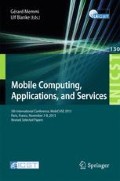Abstract
Emerging mobile applications on a growing scale adapt their functionalities and the way these are provided, leveraging the user’s contextual information, without the need of explicit settings setup from the users side. However, this contextual information, e.g., location and other environmental information, may not fully represent the users’ context. There are other contextual features related to the user’s social context that may be considered. In this paper we introduce an example of such contextual information - the intimacy context information, and we investigate if smartphone users change the way they interact with their smartphones depending on their intimacy state. We performed a 4 weeks 20-users study, with participants using their own smartphones in daily life environments, and being sampled for their intimacy perception. Our results show how intimacy context changes and relate to the smartphone usage. Therefore our research contributes by introducing new context information - intimacy, which can be leveraged by developers to create mobile applications automatically adapting to provide different services, functionalities and content depending on the intimacy level of the situation the user is in.
Access this chapter
Tax calculation will be finalised at checkout
Purchases are for personal use only
Preview
Unable to display preview. Download preview PDF.
References
Tossell, C., Kortum, P., Shepardb, C., Rahmati, A., Zhong, L.: An empirical analysis of smartphone personalisation: measurement and user variability. Behav. Inf. Technol. 31, 995–1010 (2012)
Geihs, K., Wagner, M.: Context-awareness for self-adaptive applications in ubiquitous computing environments. In: Vinh, P.C., Hung, N.M., Tung, N.T., Suzuki, J. (eds.) ICCASA 2012. LNCIST, vol. 109, pp. 108–120. Springer, Heidelberg (2013)
Efstratiou, C., Cheverst, K., Friday, A.: An Architecture for the Effective Support of Adaptive Context-Aware Applications. In: Tan, K.-L., Franklin, M.J., Lui, J.C.-S. (eds.) MDM 2001. LNCS, vol. 1987, pp. 15–26. Springer, Heidelberg (2000)
Geihs, K.: Self-Adaptivity from Different Application Perspectives. In: de Lemos, R., Giese, H., Müller, H.A., Shaw, M. (eds.) Software Engineering for Self-Adaptive Systems. LNCS, vol. 7475, pp. 376–392. Springer, Heidelberg (2013)
Evers, C., Kniewel, R., Geihs, K., Schmidt, L.: Achieving user participation for adaptive applications. In: Bravo, J., López-de-Ipiña, D., Moya, F. (eds.) UCAmI 2012. LNCS, vol. 7656, pp. 200–207. Springer, Heidelberg (2012)
Pei, L., Guinness, R., Chen, R., Liu, J., Kuusniemi, H., Chen, Y., Chen, L., Kaistinen, J.: Human behavior cognition using smartphone sensors. Sensors 13, 1402–1424 (2013)
Gerstein, R.S.: Intimacy and privacy. Ethics 89, 76–81 (1978)
Reiman, J.H.: Privacy, intimacy, and personhood. Philos. Public Aff. 6, 26–44 (1976)
Gustarini, M., Wac, K.: Estimating People Perception of Intimacy in Daily Life from Context Data Collected with Their Mobile Phone. Nokia workshop at Pervasive (2012)
Raento, M., Oulasvirta, A., Eagle, N.: Smartphones: An Emerging Tool for Social Scientists. Sociol. Methods Res. 37, 426–454 (2009)
Rahmati, A., Zhong, L.: Studying Smartphone Usage: Lessons from a Four-Month Field Study. IEEE Trans. Mob. Comput. 12, 1417–1427 (2013)
Haubo, R., Christensen, B.: Analysis of ordinal data with cumulative link models — estimation with the R-package ordinal
Ferreira, D., Dey, A.: Understanding human-smartphone concerns: a study of battery life. Pervasive Comput., 19–33 (2011)
Shin, C., Hong, J.-H., Dey, A.K.: Understanding and prediction of mobile application usage for smart phones. In: UbiComp, p. 173. ACM Press, New York (2012)
Böhmer, M., Hecht, B., Schöning, J., Kruger, A., Bauer, G.: Falling asleep with angry birds, facebook and kindle: a large scale study on mobile application usage. In: MobileHCI (2011)
Ickin, S., Wac, K., Fiedler, M., Janowski, L., Hong, J.-H., Dey, A.K.: Factors influencing quality of experience of commonly used mobile applications. IEEE Commun. Mag. (2012)
Floch, J., Frà, C., Fricke, R.: Playing MUSIC—building context-aware and self-adaptive mobile applications. Softw. Pract. Exp., 359–388 (2012)
Author information
Authors and Affiliations
Editor information
Editors and Affiliations
Rights and permissions
Copyright information
© 2014 ICST Institute for Computer Science, Social Informatics and Telecommunications Engineering
About this paper
Cite this paper
Gustarini, M., Wac, K. (2014). Smartphone Interactions Change for Different Intimacy Contexts. In: Memmi, G., Blanke, U. (eds) Mobile Computing, Applications, and Services. MobiCASE 2013. Lecture Notes of the Institute for Computer Sciences, Social Informatics and Telecommunications Engineering, vol 130. Springer, Cham. https://doi.org/10.1007/978-3-319-05452-0_6
Download citation
DOI: https://doi.org/10.1007/978-3-319-05452-0_6
Publisher Name: Springer, Cham
Print ISBN: 978-3-319-05451-3
Online ISBN: 978-3-319-05452-0
eBook Packages: Computer ScienceComputer Science (R0)

